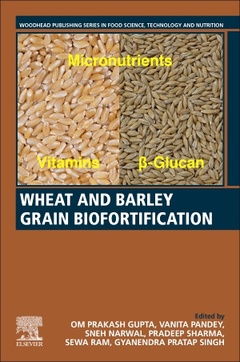Description
Wheat and Barley Grain Biofortification
Coordinators: Gupta Om Prakash, Pandey Vanita, Narwal Sneh, Sharma Pradeep, Ram Sewa, Pratap Singh Gyanendra
Language: English
Subjects for Wheat and Barley Grain Biofortification:
Keywords
Aegilops; agronomic biofortification; alkaloids; antinutrients; barley; bioaccessibility; bioavailability; biofortifcation; biofortification; biofortified crops; breeding; celiac disease (CD); cereal crops; conventional; cost-effectiveness; cyanogenic glycosides; DALYs; disease resistance; environment; epitopes; fertilizers; genetic engineering; genetic variation; genome editing; genotype; gliadin; glucans; gluten; grain zinc; hidden hunger; hidden hunger index; human health; India; iron; lectins; mainstreaming; malnutrition; metal transporter; micronutrient deficiencies; micronutrient malnutrition; micronutrients; microorganisms; minerals; nanofertilizers; national nutrition mission; nutrients; nutritional outcomes; overnutrition; phytate; phytic acid; plant growth promotion; pro-vitamin A; processing; protease inhibitors; RNAi; soil; storage; tannins; transgenic; transporters; undernutrition; villous atrophy; vitamins; wheat; wide hybridization; yield potential; zinc
364 p. · 15x22.8 cm · Paperback
Description
/li>Contents
/li>Readership
/li>Biography
/li>Comment
/li>
Wheat and Barley Grain Biofortification addresses topics associated with the alleviation of malnutrition in globally diverse populations via wheat and barley biofortification. The book synthesizes the current trends of malnutrition across the globe, the need for wheat and barley nutritional enhancement and how agronomic, microbial and molecular understanding of biofortification can help in devising significant approaches and strategies. In addition, it includes discussions on potential genetic variability available and their efficient utilization in wheat and barley for molecular breeding for nutrients, challenges and opportunities for bioavailability, and technical advancement for analysis of bioavailability.
1. The unacceptable status quo: Malnutrition challenges of the developed and developing world 2. Role of Molecular Approaches in Improving Genetic Variability of Micronutrients and their Utilization in Breeding Programs 3. Getting more micronutrients from wheat and barley through agronomic biofortification 4. Anti-nutritional factors and bioavailability: approaches, challenges and opportunities 5. A decade of progress on genetic enhancement of grain zinc and iron in CIMMYT wheat germplasm 6. Biofortification of wheat through wide hybridization and molecular breeding 7. Exploring Genetic Variability for Developing Celiac Disease Safe Wheat 8. Prospecting plant-microbe interactions for enhancing nutrient availability and grain biofortification 9. Effect of Storage and Processing Conditions on Nutrient Composition of Wheat and Barley 10. Advantage of biofortification over fortification technologies 11. Barley Biofortification: Present Status and Future prospects 12. Barley grain beta glucan enrichment: Status and opportunities 13. Biofortification for enhancing nutritional outcomes and policy imperatives
Researchers in both wheat and barley/cereal science and those exploring means of enhancing nutritional value of foods
Dr. Pandey’s areas of specialization are molecular biology, transgenics and plant transformation, bioinformatics tools, plant RNAi studies, proteomics, transcriptomics, microarrays and molecular markers. Dr Pandey is a part of several projects with key focus on nutritional and processing quality enhancement of wheat using biochemical and molecular approaches with major emphasis on wheat grain biofortification. Dr Pandey has worked at Indian Agricultural Research Institute (IARI) and National Institute for Plant Biotechnology and had developed tobacco transgenics and nutritionally enhanced soybean low-phytate transgenics. Publications include nine research papers, several technical bulletins, articles and book chapters.
Dr. Narwal’s main area of research is on nutritional and processing quality of wheat and barley. She has worked on the antioxidant potential and phenolic compounds in wheat and barley including the effect of various processing conditions, cooking methods and blending on these traits. She is also working on the biofortification of wheat with iro
- Addresses the need for wheat and barley biofortification to address global nutrition demands
- Places emphasis on the current agronomic and molecular understanding of biofortification
- Discusses the potential utilization of genetic variability
- Highlights the economics of biofortification over fortification technology
These books may interest you

Biofortification of Food Crops 105.49 €



